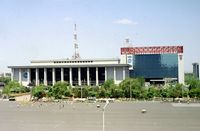Korean Broadcasting System
 |
|
| Type | Broadcast radio and television |
|---|---|
| Country | |
| Availability | National International |
| Owner | Government of South Korea |
| Key people | Lee Byung Soon, President |
| Launch date | 1961 (television); 1965 (radio); 1996 (satellite); 1998 (digital); 2005 (DMB) |
| Official Website | www.kbs.co.kr |
| Korean name | |
|---|---|
| Hangul | 한국방송 |
| Hanja | 韓國放送 |
| Revised Romanization | Han-guk Bangsong |
| McCune–Reischauer | Han'guk Pangsong |
Korean Broadcasting System (KBS) (한국 방송 공사 Hanguk Bangsong Gongsa) is the biggest of three major Korean television networks. This public broadcasting network is best known for nightly newscasts and lavish historical dramas, although private broadcasters such as MBC, EBS and SBS have produced popular historical dramas in recent years as well.
Contents |
Structure


KBS is a 'public organization' that, by law, receives public funding from the Korean Government but is independently managed. As mentioned on the Korean Constitution, the president of KBS is recommended by its board of directors to the President of Korea. Political parties in Korea have the right to name members of the board of directors of KBS. Since the President of South Korea usually has leadership over the members of the ruling party, KBS's president is considered to be designated by the president of Korea. This procedure has incurred worries of political intervention in KBS' governance and has led to many thinking that the current system of recruiting needs to be revised.
Around 37.8% of its revenue comes from a mandatory Television Licence Fee, while 47.6% of the revenue comes from commercial advertisement sales.[1] For national or governmental programs such as International Radio service (KBS World Radio) and the Radio service for physically handicapped people, KBS receives public funds from the Korean government.
Channels
Terrestrial television
- KBS 1TV - news, current affairs, education, sports and culture. Launched 1961 as HLKA-TV. KBS 1TV is solely run using License Fee and doesn't show any commercial announcement. It is on Channel 9 on VHF for Analog.
KBS 1TV is also showing public information films made by KBS and entertainment programming but the rest are on KBS 2TV.
- KBS 2TV - Lifestyle,entertainment and drama,And a minimal amount of News and current affairs programs. Launched in 1964 as Tongyang Broadcasting Corporation, not to be mistaken as TBC-TV (SBS' Regional Station in Daegu). It is on Channel 7 on UHF for Analog.
Cable and Satellite television
- KBS Prime - culture and drama. Launched in 1996 as KBS satellite 2, renamed as KBS Korea in 2002.
- KBS Drama - formerly KBS Sky Drama. Launched in 2002.
- KBS N Sports - formerly KBS Sports/KBS Sky Sports. Also launched in 2002.
- KBS Joy - comedy and quiz show. Launched in 2006.
These four channels are carried by Cable and Satellite operators in Korea. There are 100+ Cable operators in Korea and Skylife is sole satellite television service provider. These channels are managed and operated by KBS N, a subsidiary company of KBS.
Radio
- KBS Radio 1 (AM/FM) - news, current affairs, documentary and culture. Launched in 1965.
- KBS Radio 2 (AM/FM) - entertainment. Launched in 1967 as KBS Second Programme.
- KBS Radio 3 (AM/FM) - Launched in 1973 as RSB (Radio Seoul Broadcasting), renamed as TBC Radio in the 1970s, then current name in 1980, and ceased broadcasting in 1981. It was later replaced by KBS Radio 2's regional radio service and Educational FM (now EBS FM). Later re-launched in 2000 as a spin-off from KBS Radio 2. For the first time in 2010, it was launched on FM and restructured as a radio station for the disabled.
- KBS 1FM (FM) - classical music and folkmusic. Launched in 1979 as KBS-FM.
- KBS 2FM (89.1 MHz Cool FM) - popular music. Launched in 1966 as TBC-FM.
- KBS social radio (shortwave & mediumwave) - Launched in 1975 as KBS Third Programme
- KBS World Radio - international service [see also RFI, BBC World Service and Radio Canada International], as well as satellite and international services.
List of KBS programs
Dramas
- Gumiho: Tale of the Fox's child (구미호: 여우누이뎐; 2010)
- King of Baking, Kim Tak Goo (제빵왕 김탁구; 2010)
- Please Marry Me (결혼해주세요; 2010)
- Comrades (전우; 2010)
- My Country Calls (국가가 부른다; 2010)
- Birth of the Rich Man (생년월일 부자의; 2010)
- Mom is Pretty Too (엄마도 예쁘다; 2010)
- Cinderella's Sister (신데렐라 언니; 2010)
- Happiness in the Wind (바람 불어 좋은날; 2010)
- Merchant Kim Man Deok (거상 김만덕; 2010)
- The Reputable Family (명가; 2010)
- Chuno (추노; 2010)
- A Good Day For The Wind To Blow (2010)
- Master of Study (공부의 신; 2010)
- Three Brothers (수상한 삼형제; 2009-10)
- I'll Give You Everything (다 줄거야; 2009-10)
- IRIS (아이리스; 2009)
- The Man Who Can't Get Married (결혼 못하는 남자; 2009)
- The Slingshot (남자이야기; 2009)
- Boys Over Flowers (꽃보다 남자; 2009)
- Hong Gil Dong (쾌도 홍길동; 2008)
- King Sejong the Great (대왕세종; 2008)
- Likeable or Not (미우나고우나; 2007~2008)
- The Snow Queen (눈의 여왕; 2006 ~ 2007)
- Dae Joyoung (TV Series) (대조영; 2006~2007)
- The Vineyard Man (포도밭 그사나이; 2006)
- Seoul 1945 (TV Series) (서울1945; 2006)
- Hwang Jin-i (TV series) (황진이; 2006)
- The Invisible Man (투명인간 최장수; 2006)
- Erexion (이레자이온; 2006)
- Pure In Heart (열아홉 순정; 2006)
- Wedding (2005)
- Sassy Girl Chun Hyang (쾌걸 춘향; 2005)
- Immortal Yi Soon-shin (불멸의 이순신; 2004~2005)
- I'm Sorry, I Love You (미안하다,사랑한다; 2004)
- Famous seven princesses (소문난 칠공주)
- Forbidden Love (구미호외전; 2004)
- Full House (풀하우스; 2004)
- Emperor of the Sea (해신; 2004)
- Empress Myeongseong (명성황후; 2001)
- Mina (미나; 2001)
- Endless Love series:
-
- Autumn Fairy Tale (가을동화; also known as Autumn In My Heart; 2000)
- Winter Sonata (겨울연가; 2002)
- Summer Scent (여름향기; 2003)
- Spring Waltz (봄의 왈츠; 2006)
- First Love (첫사랑; 1996)
- Papa (파파; 1996)
- Salut D'Amour (사랑의 인사; 1994)
- Love OK (사랑해도 괜찮아)
- Drama City (드라마시티)
Documentaries
- KBS Special (KBS 스페셜)
- The story of Korean History (한국사'전')
- Science Cafe(과학카페)
- Kingdom of Animals(동물의왕국)
- KBS-NBN Documentaries A Joint Project Together with National Broadcasting Network of the Philippines.
- Insight on Asia (인사이트 아시아)
- Noodle Road (누들로드)
- Asian Corridor in Heaven (차마고도)
- Documentary 3 Days
News and Current Affairs
- KBS News 9 (KBS 9시뉴스.) Main news programme on KBS 1TV
- KBS News Plaza (KBS 뉴스광장. Breakfast programme)
- KBS News Network (KBS 뉴스네트워크. Evening programme with some local segments)
- KBS Newsline (KBS 뉴스라인) Midnight programme
- Midnight Debate-Live (생방송 심야토론. Sunday-night debate programme)
- Media Focus (미디어 포커스. Mediawatch programme)
- Coverage-File 4321 (취재파일 4321. Sunday's In-depth news coverage programme)
- KBS 8 News Time (KBS 8 뉴스타임) - News Program on KBS 2TV
Entertainment
- 1 vs. 100 (1 대 100, Korean version of Endemol game show with a top prize of 50,000,000 Won; played like the 2006-07 US version.)
- The Clinic for Married Couples: Love and War
- Comedy File
- Concert 7080 (콘서트7080)
- Gag Concert (개그콘서트)
- Global Talk Show (미녀들의 수다)
- Happy Sunday (해피선데이), (1박2일)
- Happy Together (해피투게더 Season 3)
- Imagination Plus (상상 플러스)
- Sponge (스펀지, Weekly 'Infotainment' programme)
- Pokso Club (폭소 클럽)
- Pokso Club 2 (폭소 클럽2)
- Love Letter by Yun Do-hyeon (윤도현의 러브레터)
- Music Bank (뮤직뱅크)
- Quiz Daehanminguk (means 'Quiz Korea', the nation's biggest quiz show. Top prize: 60,000,000 Won.)
- Star Golden Bell (스타 골든벨)
- Smile Station (웃음 충전소)
- Vitamin (비타민)
- Invincible Youth
- Dream Team Season 2
- Hello Baby Season 1 (with Girls' Generation)
- Hello Baby Season 2 (with SHINee)
- Entertainment Weekly
- sketchbook of youheeyeul
Children's
- Funny Funny (파니파니)
- Goosebumps (명소름닭살 )
Other
- Teletubbies (Korean: 텔레토비)
KBS World
KBS World is the international television and radio service of KBS. KBS World television is a television channel that runs mostly programs commissioned for KBS' 2 terrestrial networks: KBS1 and KBS2. KBS World television is distributed over several international communication and broadcasting satellites S-DMB such as IS-8, IS-9, IS-10, Hotbird 6, Galaxy 10R, Arabsat 4D. Local cable and/or satellite operators receive the signal from one of these satellite and carry the signal to end subscribers of their own networks. KBS doesn't allow individual viewer to receive the signal from IS-8, IS-9, IS-10 and Galaxy 10R. The signal from Arabsat 4D is Free-to-Air service while viewers using Hotbird 6 are required to pay monthly subscription fee. KBS World television is for both local people and Korean expatriates around the world. As of July 2007, around 65% of its programs are broadcast with English Subtitles. KBS World has two overseas subsidiaries: KBS America and KBS Japan. KBS World Japan is independently operated by KBS Japan, KBS' subsidiary in Japan and practically all programs are provided with Japanese subtitles.
KBS launched KBS World officially on July 1, 2003. As of July 2007, KBS World television is available in 32 countries and reportedly more than 40 million households around the world are accessible to KBS World TV.
KBS World television runs on a 24hr schedule with programming ranging from news, sports, dramas, variety shows and children's programs.
Foreign Partners
- CBC (Canada)
- National Broadcasting Network (Philippines)
- ABS–CBN (Philippines)
- GMA Network (Philippines)
- NHK (Japan)
- TF1 (France)
- ZDF (Germany)
- ABC (United States)
- CCTV (China)
See also
- List of Korea-related topics
- KBS World Radio
- KBS America
- KBS World Canada
- List of South Korean broadcasting networks
References
- ↑ KBS Annual Report 2006-2007, KBS, 2007.(As mentioned on page 30)
External links
- KBS Official Site (Korean) (English)
- KBS World
- KBS World News Today (English)
- KBS America (English)
- KBS America's VOD Service (Korean) (English)
|
||||||||||||||||||||||||||||||||||||||||||||||||||||||||||||||||||||||||||||||||||||||||||||||||||||||||||||
|
|||||||||||